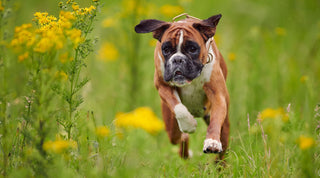Understanding the Athletic Needs of Boxers
Boxers are a breed known for their high energy level and athletic build. As dynamic and muscular dogs, they require a specific approach to health and wellness to ensure they remain fit and healthy throughout their lives. Keeping your canine athlete in top shape involves a balanced combination of diet, exercise, mental stimulation, and regular veterinary care.
Nutrition for the Active Boxer
Balanced Diet
The cornerstone of any health regimen for a boxer is a well-balanced diet. Boxers thrive on high-quality dog food rich in protein to support their muscular physique and energy needs. The diet should also be well-balanced with essential fats, carbohydrates, vitamins, and minerals. Always consult with a veterinarian to tailor a feeding plan to your dog's age, weight, and activity level.
An easy way to ensure your Boxer gets these nutrients is by adding a scoop of Neo Bites Health Aid Meal Topper over your pup's existing meals. It's made from wholesome superfoods like kale, oats, turmeric, kelp and insect protein, and carefully formulated by a veterinarian—so you can rest assured they'll be getting the right amount of what they need.
Hydration
Adequate hydration is equally important, especially since boxers tend to be very active and can easily dehydrate during exercise. Always ensure that your boxer has access to fresh, clean water, and monitor their intake, especially after vigorous activities or hot weather outings.
Supplements
Depending on the individual needs of your boxer, dietary supplements may be recommended by your vet. For instance, joint supplements like glucosamine and chondroitin can be particularly beneficial for these large breed dogs that are prone to joint issues as they age.
Exercise is Key to a Boxer's Health
Daily Exercise
Boxers require regular exercise to maintain a healthy weight and to burn off energy. Daily walks, runs, and play sessions help keep their muscles toned and their minds stimulated. Agility training can also be an excellent way to provide physical and mental challenges for your boxer.
Rest and Recovery
Though exercise is crucial, rest is equally important for your boxer's health. Over-exercising can lead to fatigue and injury, so it's essential to balance active periods with rest and downtime. Observing your dog and providing a comfortable place to sleep will support muscle recovery and overall health.
Avoiding Overheating
Boxers are brachycephalic, meaning they have short noses and flat faces, which can make breathing more labored and can lead to overheating. It's essential to watch for signs of overheating during exercise and provide plenty of cool, shaded resting spots in hot weather, as well as maintaining proper hydration.
Mental Health and Stimulation
Enrichment Activities
Keeping your boxer mentally stimulated is just as important as physical exercise. Enrichment activities can include puzzle toys, scent work, hide-and-seek, and training sessions that challenge the mind.
Socialization
Socializing your boxer with other dogs and people will contribute to their mental well-being. Positive interactions can help prevent behavioral issues and keep your canine athlete socially balanced.
Regular Veterinary Care
Check-Ups and Vaccinations
Regular check-ups with a veterinarian are essential for detecting and preventing health issues early on. These visits are also an opportunity to keep your boxer up-to-date with vaccinations and parasite prevention.
Monitoring Health Conditions
Boxers are predisposed to certain health conditions, such as heart issues, hip dysplasia, and certain cancers. Your vet can help you understand these risks and assist in early detection and management.
Maintaining a Healthy Weight
Controlling your boxer's weight is vital for their overall health and to avoid putting unnecessary strain on their joints. Alongside regular exercise, monitor your dog's caloric intake and adjust their diet as needed in consultation with your veterinarian.
Conclusion
Your boxer's health and wellness require a careful balance of nutrition, exercise, mental stimulation, and regular veterinary attention. By understanding the unique needs of your canine athlete, you can provide them with a fulfilling life and help them excel in their natural athleticism. Remember that every dog is an individual, and the best care comes from tailoring these guidelines to your boxer's specific requirements.






